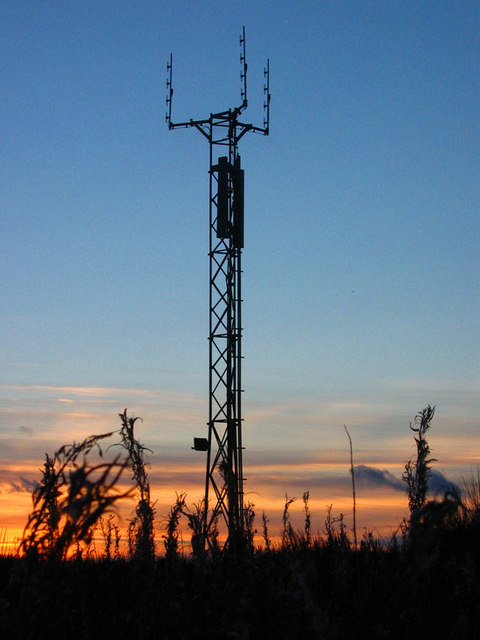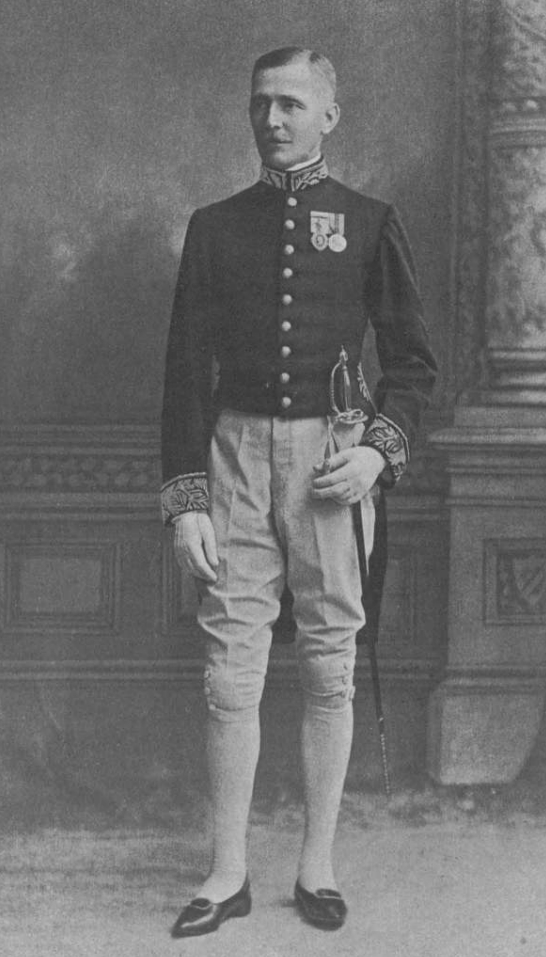|
Oswald Lumsden
Oswald Farquhar Lumsden (26 June 1874 — 8 April 1948) was a Scottish first-class cricketer and an officer in the Indian Civil Service. The son of the advocate James Forbes Lumsden, he was born in June 1874 at Peterculter, Aberdeenshire. Lumsden was educated at Merchiston Castle School, before matriculating to the University of Edinburgh, where he transferred to Christ Church, Oxford. While studying at Oxford, he gained a blue in tennis. After graduating from Oxford, he joined the Indian Civil Service (ICS) in 1897. He arrived in British India in 1898, serving in the Punjab as an assistant commissioner. He was an assistant registrar of cooperative societies in the Punjab in May 1914, before becoming the controller of hostile trading concerns in January the following year. In May 1915, he was appointed a district and session judge. In January 1913, Lumsden was appointed to the Council of Sir Louis Dane, the Lieutenant-Governor of the Punjab, in January 1913. He served his ... [...More Info...] [...Related Items...] OR: [Wikipedia] [Google] [Baidu] |
Peterculter
Peterculter ( sco, Petercouter), also known as Culter (Scots: ''Couter''), is a suburb of Aberdeen, Scotland, about inland from Aberdeen city centre. Peterculter is on the northern banks of the River Dee, near the confluences with Crynoch Burn and Leuchar Burn. Following the 1996 Scottish council boundary changes it became part of the City of Aberdeen's Lower Deeside ward. The latter part of the name is said to come from the Gaelic compound word "Cul-tir", which signifies the "back part" of the country. History About south west of the Peterculter is the site of the Roman marching camp at Normandykes. King William the Lion bestowed the church of Kulter, "iuxta Abirdene", upon the Abbey and monks of St Mary of Kelso, about 1165–1199. The gift was afterwards confirmed by Mathew, Bishop of Aberdeen, within whose diocese the church sat. Alan of Soltre, chaplain, who had probably been an ecclesiastic of the hospital, or monastery of Soutra, in Lothian, was presen ... [...More Info...] [...Related Items...] OR: [Wikipedia] [Google] [Baidu] |
British India
The provinces of India, earlier presidencies of British India and still earlier, presidency towns, were the administrative divisions of British governance on the Indian subcontinent. Collectively, they have been called British India. In one form or another, they existed between 1612 and 1947, conventionally divided into three historical periods: *Between 1612 and 1757 the East India Company set up factories (trading posts) in several locations, mostly in coastal India, with the consent of the Mughal emperors, Maratha Empire or local rulers. Its rivals were the merchant trading companies of Portugal, Denmark, the Netherlands, and France. By the mid-18th century, three ''presidency towns'': Madras, Bombay and Calcutta, had grown in size. *During the period of Company rule in India (1757–1858), the company gradually acquired sovereignty over large parts of India, now called "presidencies". However, it also increasingly came under British government oversight, in effect shar ... [...More Info...] [...Related Items...] OR: [Wikipedia] [Google] [Baidu] |
Alfred Lumsden (British Army Officer)
Brigadier-General Alfred Forbes Lumsden, DSO (June 1877 – 24 June 1918) was a British Army officer. He was killed in action in near Arras while touring the trenches. At the time, he was in command of the 46th Brigade. His son was the actor Geoffrey Lumsden. His brothers were Oswald Lumsden and William Lumsden William Forbes Lumsden (4 September 1879 — 28 October 1956) was a Scottish people, Scottish first-class cricketer and British Army officer. The son of the advocate James Forbes Lumsden, he was born in September 1879 at Peterculter, Petercul .... References * Davis, Frank; Maddocks, Graham (1995). ''Bloody Red Tabs - General Officer Casualties of the Great War, 1914-1918''. London: Leo Cooper, p. 86. {{DEFAULTSORT:Lumsden, Alfred Forbes British Army brigadiers Companions of the Distinguished Service Order British military personnel killed in World War I Royal Scots officers British military personnel of the Second Boer War British Army generals of ... [...More Info...] [...Related Items...] OR: [Wikipedia] [Google] [Baidu] |
Not Out
In cricket, a batter is not out if they come out to bat in an innings and have not been dismissed by the end of an innings. The batter is also ''not out'' while their innings is still in progress. Occurrence At least one batter is not out at the end of every innings, because once ten batters are out, the eleventh has no partner to bat on with so the innings ends. Usually two batters finish not out if the batting side declares in first-class cricket, and often at the end of the scheduled number of overs in limited overs cricket. Batters further down the batting order than the not out batters do not come out to the crease at all and are noted as ''did not bat'' rather than ''not out''; by contrast, a batter who comes to the crease but faces no balls is ''not out''. A batter who ''retires hurt'' is considered not out; an uninjured batter who retires (rare) is considered ''retired out''. Notation In standard notation a batter's score is appended with an asterisk to show the ... [...More Info...] [...Related Items...] OR: [Wikipedia] [Google] [Baidu] |
Saleh Mohammad (cricketer)
{{hndis, Mohammad, Saleh ...
Saleh Mohammad may refer to: * Saleh Mohammad (Afghan politician) * Saleh Mohammad (Indian politician) (born 1977) * Saleh Mohammad (swimmer) (born 1986), Syrian swimmer * Saleh Mohammad (snooker player) (born 1973), snooker player from Afghanistan * Saleh Mohammed (weightlifter) (born 1965), Iraqi competitor in weightlifting at the 1986 Asian Games Weightlifting was contested from September 21 to October 1, 1986, at the 1986 Asian Games in Olympic Weightlifting Gymnasium, Seoul, South Korea. The competition included only men's events for ten different weight categories. China topped the meda ... [...More Info...] [...Related Items...] OR: [Wikipedia] [Google] [Baidu] |
Lahore Tournament
Lahore ( ; pnb, ; ur, ) is the second most populous city in Pakistan after Karachi and 26th most populous city in the world, with a population of over 13 million. It is the capital of the province of Punjab where it is the largest city. Lahore is one of Pakistan's major industrial and economic hubs, with an estimated GDP ( PPP) of $84 billion as of 2019. It is the largest city as well as the historic capital and cultural centre of the wider Punjab region,Lahore Cantonment globalsecurity.org and is one of Pakistan's most socially liberal, |
Bagh-e-Jinnah, Lahore
''Bagh-e-Jinnah'' ( ur, باغِ جناح, , Jinnah Garden), formerly known as Lawrence Gardens, is a historical park in the city of Lahore, Pakistan. The large green space contains a botanical garden, Masjid Dar-ul-Islam, and Quaid-e-Azam Library. There are also entertainment and sports facilities within the park: an open-air theater, a restaurant, tennis courts and the Gymkhana Cricket Ground. It is located on Lawrence Road next to Lahore Zoo, directly across from the Governor's House on The Mall. History The site was originally occupied by the Agri-Horticultural Society of the Punjab and had been planned as a botanical garden modelled on Kew Gardens in London.REHMAN, ABDUL. "CHANGING CONCEPTS OF GARDEN DESIGN IN LAHORE FROM MUGHAL TO CONTEMPORARY TIMES". Garden History, vol. 37, no. 2, 2009, pp. 205–217. JSTOR, www.jstor.org/stable/27821596. Accessed 19 February 2021. The garden was named after John Lawrence, 1st Baron Lawrence, who served as the first Chief Commissi ... [...More Info...] [...Related Items...] OR: [Wikipedia] [Google] [Baidu] |
Muslims Cricket Team
The Muslims cricket team was an Indian first-class cricket team which took part in the annual Bombay tournament. The team was founded by members of the Muslim community in Bombay. The Muslims joined the Bombay tournament in 1912, when they accepted an invitation from the Europeans, Hindus and Parsees to expand the competition, which was renamed the Bombay Quadrangular. The Muslims had a strong team during the last decade or so of the tournament's existence, winning the title six times between 1934–35 and 1944-45. External links First-class matches played by Muslimsat CricketArchive Sources * Vasant Raiji, ''India's Hambledon Men'', Tyeby Press, 1986 * Mihir Bose, ''A History of Indian Cricket'', Andre-Deutsch, 1990 * Ramachandra Guha Ramachandra "Ram" Guha (born 29 April 1958) is an Indian historian, environmentalist, writer and public intellectual whose research interests include social, political, contemporary, environmental and cricket history, and the field of econ ... [...More Info...] [...Related Items...] OR: [Wikipedia] [Google] [Baidu] |
First-class Cricket
First-class cricket, along with List A cricket and Twenty20 cricket, is one of the highest-standard forms of cricket. A first-class match is one of three or more days' scheduled duration between two sides of eleven players each and is officially adjudged to be worthy of the status by virtue of the standard of the competing teams. Matches must allow for the teams to play two innings each, although in practice a team might play only one innings or none at all. The etymology of "first-class cricket" is unknown, but it was used loosely before it acquired official status in 1895, following a meeting of leading English clubs. At a meeting of the Imperial Cricket Conference (ICC) in 1947, it was formally defined on a global basis. A significant omission of the ICC ruling was any attempt to define first-class cricket retrospectively. That has left historians, and especially statisticians, with the problem of how to categorise earlier matches, especially those played in Great Britain ... [...More Info...] [...Related Items...] OR: [Wikipedia] [Google] [Baidu] |
Edward Douglas MacLagan
Sir Edward Douglas Maclagan (25 August 1864 – 22 October 1952) was an administrator in British India. He was born in the Punjab, the son of General Maclagan of the Royal Engineers and educated at Winchester College and New College, Oxford. In 1883 he passed the Indian Civil Service Examination. MacLagan wrote widely on Indian history and superintended the Punjab census of 1891. With Horace Arthur Rose, Superintendent of Ethnography in the Punjab in the early 20th century, he compiled a large work, '' A Glossary of the Tribes and Castes of the Punjab and North-West Frontier Province'', including material from Denzil Ibbetson's 1881 census. In 1906 he was appointed Chief Secretary to the Government of the Punjab, in 1910 was appointed Secretary to the Revenue Department of the Indian Government and from 1915 to 1918 served as Secretary to the Education Department. He became Lieutenant-Governor of the Punjab in 1919 and Governor from 1921 to 1924. He was Chancellor of Univ ... [...More Info...] [...Related Items...] OR: [Wikipedia] [Google] [Baidu] |
Michael O'Dwyer
Michael Francis O'Dwyer (28 April 1864 – 13 March 1940) was an Irish Indian Civil Service (ICS) officer and later the Lieutenant Governor of Punjab, British India, between 1913 and 1919. During O'Dwyer's tenure as Punjab's Lieutenant Governor the Jallianwala Bagh massacre occurred in Amritsar, on 13 April 1919. As a result, his actions are considered among the most significant factors in the rise of the Indian independence movement. O'Dwyer endorsed Reginald Dyer's action at Jallianwala Bagh and made it clear that he considered Dyer's orders to shoot at the crowds was correct. He subsequently administered martial law in Punjab, on 15 April and backdated it to 30 March 1919. In 1925, he published ''India as I Knew It'' in which he wrote that his time as administrator in Punjab was preoccupied by the threat of terrorism and the spread of political agitation. In 1940, in retaliation for the massacre, O'Dwyer was assassinated by the Indian revolutionary Udham Singh. Early life ... [...More Info...] [...Related Items...] OR: [Wikipedia] [Google] [Baidu] |


_June_4_2004.jpg)
